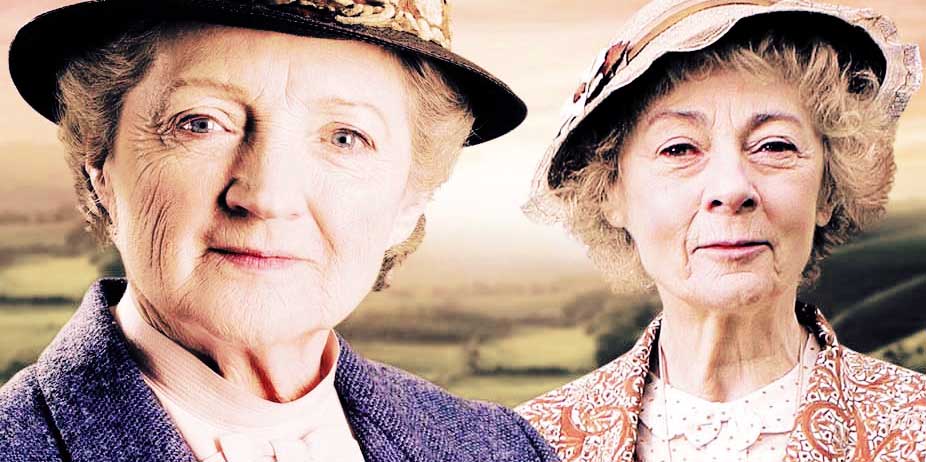
Miss Marple, Season Four (2008)
Reviewer: Rissi C.
The fourth series of ITV Studios adaptation of Agatha Christie’s Marple saw a new lead actress in the title role and in its opening hour-and-a-half film had an altogether “different” approach. Questions are many in terms of living up to its predecessors: was the acting up to par with Geraldine McEwan’s interpretation? Is the always-mysterious writing just as intricate? In short, was the end result better or worse?
Nestled in the quaint village of St. Merry Mead is the home of Miss Jane Marple (Julia McKenzie). Something of an amateur sleuth Miss Marple is also a kind-hearted lady who wants to give young girls an opportunity to make a way for themselves in the world – she trains them for household service. Over the years, she has had dozens of girls in her home, primarily those who are orphans. Today she is saying good-bye to the dim-witted Gladys (Rose Heiney). Gladys is a scatter-brained girl of seventeen and quite without the proper knowledge to look out for her own well-being – if someone were to swindle her, poor Gladys wouldn’t know what hit her. It is Gladys that sends Miss Marple to the Fortescue family estate. Following the sudden poisoning death of its patriarch Rex and his second much younger wife Adele, Gladys too is found lifeless amidst the laundry. Being quite fond of the girl, Miss Marple packs up her knitting and traipses up to the country estate where Inspector Neele (Matthew McFayden) is capably handling the triple-murder homicide.
Chief among the suspects are eldest son Percival (Ben Miles), his wife Jennifer (Liz White) and youngest sister Eleanor (Hattie Morhan), along with the household staff which includes a suspicious housekeeper by the name of Mary Dove (Helen Baxendale). When the estranged younger son Lance (Rupert Graves) arrives from Africa with his beloved wife Pat (Lucy Cohu), things become even more suspicious and despite his best efforts, Inspector Neele is stumped.
First impressions do not bode well for this new direction. Don’t get me wrong: the show is still entertaining to watch unfold and attempt to piece together the puzzle with the lovable Miss Marple, but its first installment (“A Pocket Full of Rye”) just didn’t have the same spark as its predecessors. Not only does it have three scenes of a sensual nature, its set-up is less than absorbing. Geraldine McEwan starred in the first three series and she was simply marvelous (Julia’s demeanor is much more suited to her role in Cranford) – as were the first three sets better in general. This particular episode is quite clever despite its faults and Matthew McFayden is just fabulous. I think perhaps he is the best inspector/policeman character to appear on the series to date. Something about the way he played the character was just… neat – and that line about him resembling Errol Flynn was priceless.
As with all of the other series, this set consists of four hour-and-a-half tele-films. The most impressive was “Why Didn’t they Ask Evan?” It is the most creative, comical and confounding of the bunch. The young inquisitive, spit-fire girl named Frankie who becomes entangled in a murder through her friend is just priceless – I loved everything about her personality, while my favorite title is “Murder is Easy.” It was extremely complex but as the number of murders continued to climb, I found myself questioning the wisdom of killing off so many characters for a couple of reasons. One of which was that it seemed to only contribute confusion and a second reason being it lent itself to an overly morbid tone – more than the usual. One thing series four did not scrimp on was its guest stars. Anyone and everyone of Britain's talent has turned up on these at some point, here there is – in addition to MacFayden, Penelope Wilton, Natalie Dormer and Benedict Cumberbatch.
This isn’t exactly a show for
youngsters. The opening show has three clothed sex scenes (“A Pocket Full
of Rye”). A married woman flirts with any guy who will give her notice. The
fourth episode tells of an affair and features some of the most demented
characters (one guy walks around with a snake). Characters die in every one of
the four episodes – some are poisoned, others are strangled along with other
methods of murder. The costuming
and the sets are detailed and overflowing with historical accents and while, I
cannot say with certainty they are period authentic, everything is pretty to
look at. Even being murder mysteries, many of the characters are still likable
and there is often a happy ending for someone – usually two people who deserve
it most. Overall, I refer the prior sets for Miss Marple’s dry-witted,
matter-of-fact persona but series’ four still brings fans some fabulous writing
and talent – and is not to be missed by any fan of a good murder riddle!
